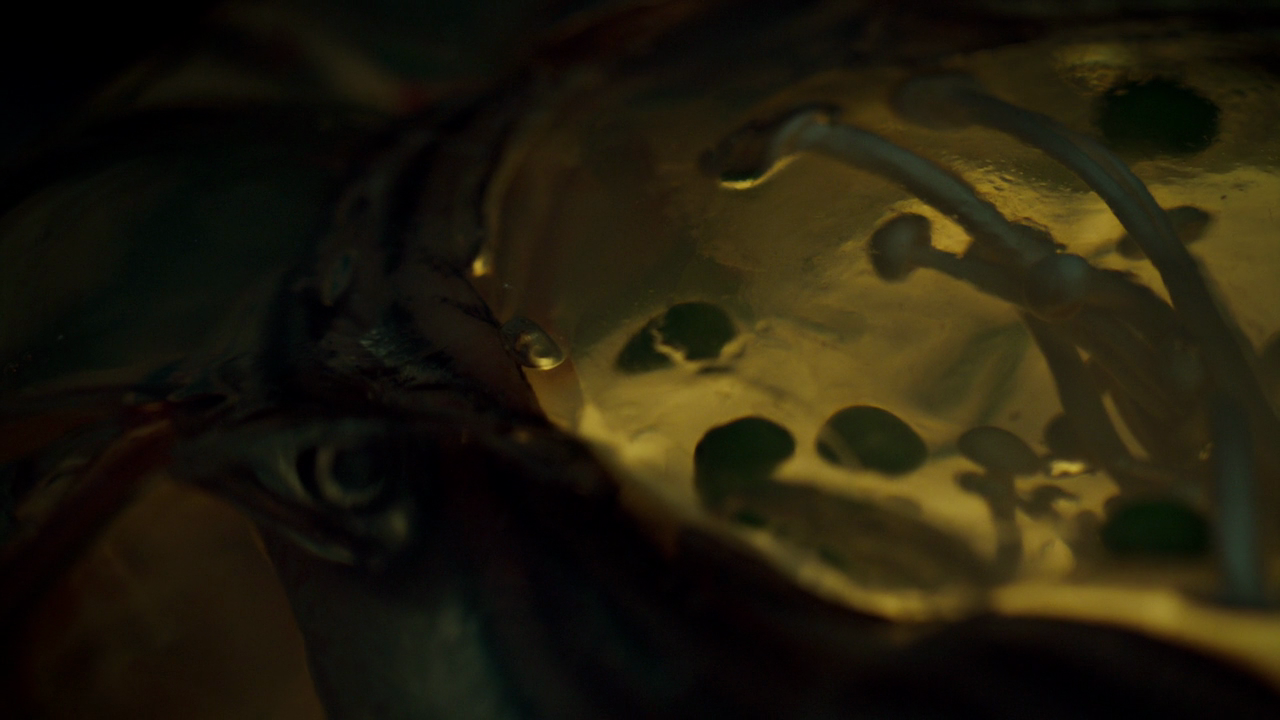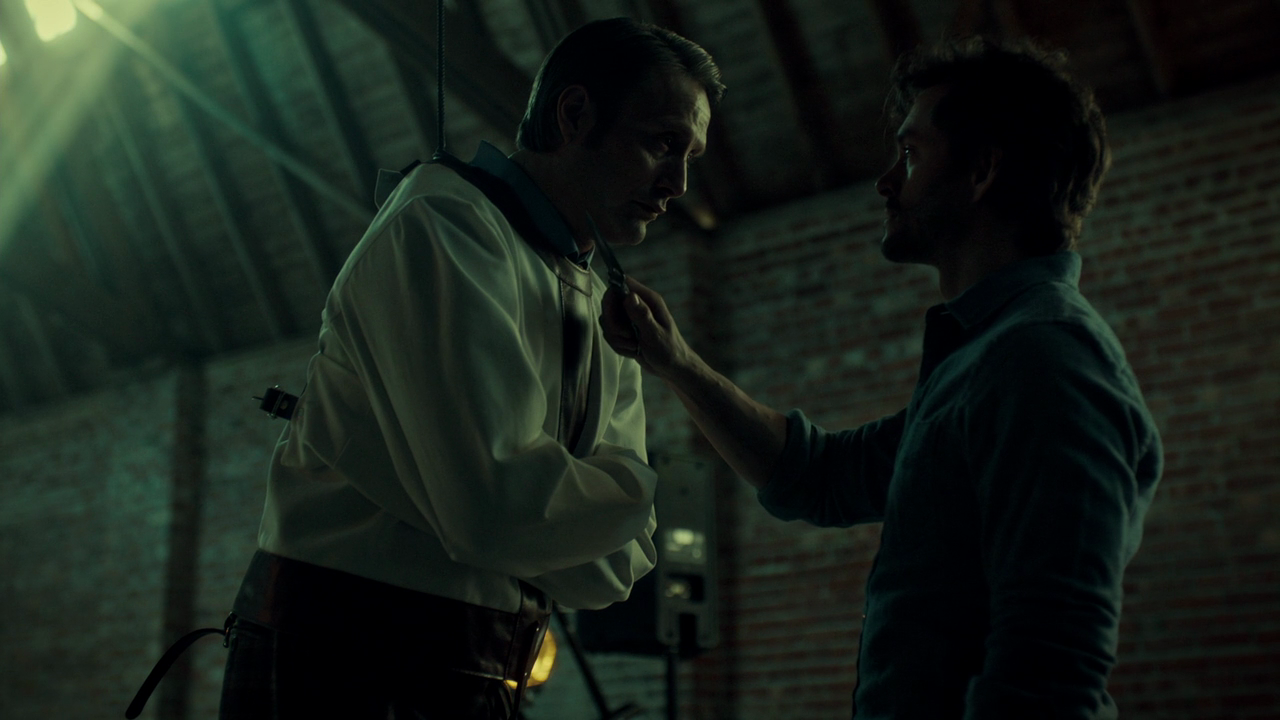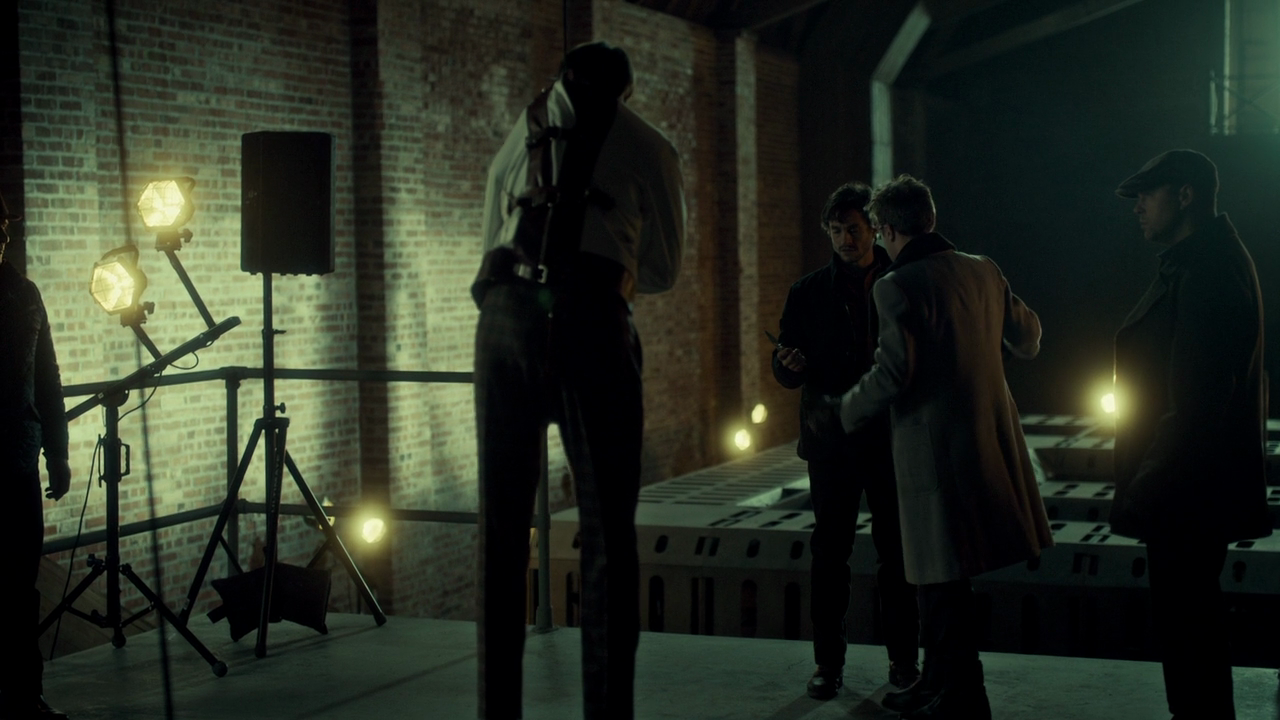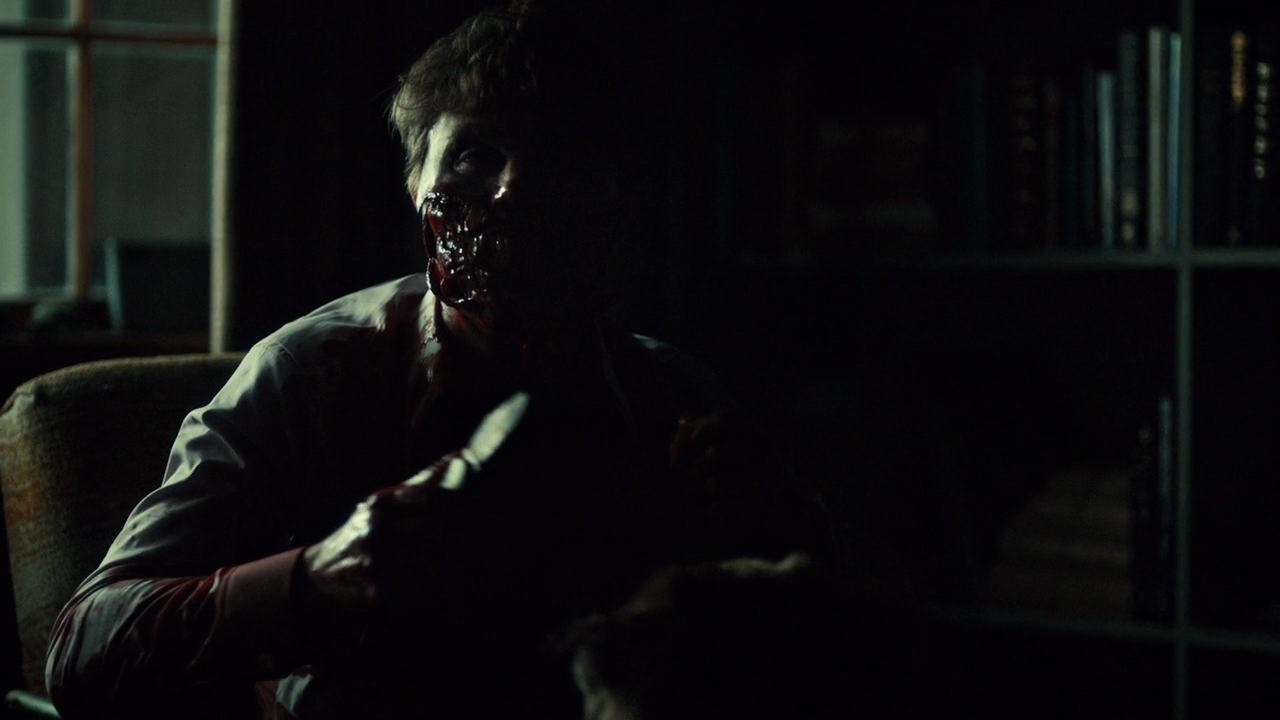The Proverbs of Hell 25/39: Tome-Wan
 TOME-WAN: A miso or vegetable soup with rice. This signifies nothing more than the approaching end of the meal.
TOME-WAN: A miso or vegetable soup with rice. This signifies nothing more than the approaching end of the meal.
WILL GRAHAM: Can you explain my actions? Posit my intentions? What would be your theory of my mind?
HANNIBAL: I have an understanding of your state of mind. You understand mine. We’re just alike. This gives you the capacity to deceive me, and be deceived by me.
WILL GRAHAM: I’m not deceiving you, Dr. Lecter. I’m just pointing out the snare around your neck. What you do about it is entirely up to you.
HANNIBAL: You put the snare around my neck.
This is going appreciably differently from Will and Hannibal’s previous efforts to get people to murder the other for them. Hannibal’s first line is the closest thing to an explanation – at this point they are so enmeshed in one another’s psyches that trying to kill each other is, as Steven Moffat would put it, their flirting. Will, however, misses the real takeaway, which is Hannibal’s note that he has the capacity to deceive him. Spoilers: this is going to go badly for Will. (Admittedly that spoiler is basically just always true.)
HANNIBAL: Why did you tell Mason Verger I want to kill him?
WILL GRAHAM: I was curious what would happen. It’s true, isn’t it? You do want to kill him. Or you want me to. Either way, you’d like him dead. I’m just giving you a little nudge.
HANNIBAL: Mason is discourteous. Discourtesy is unspeakably ugly to me.
WILL GRAHAM: Are you thinking about eating him?
HANNIBAL: Whenever feasible, one should always try to eat the rude.
Hannibal’s motive is at last stated explicitly, and it’s exactly what you’d expect: he eats people because they are ugly. Though in typical and glorious arrogance, he extends this to a general principle of cannibalism.
Will’s aesthetic has evolved rapidly over just a couple of weeks. There is still intimacy to his imagined murder of Hannibal – looking into his eyes as he cuts his throat. But there is an added vein of theater – Hannibal being fed to pigs, and the set piece of hanging him, slitting his throat, then dropping him to the pigs. Although we cannot reduce Will to a set of influences, it is in this case not even a little hard to track those influences.
WILL GRAHAM: Hannibal is trying to manipulate me into murdering one of his patients. Mason Verger. I can manipulate Hannibal into killing him instead.
JACK CRAWFORD: What’s Verger done?
WILL GRAHAM: Hannibal considers him rude. That’s motive enough. It’s as though committing murders has purged him of lesser rudeness.
This exchange shines light on an aspect of Hannibal’s pathology that’s usually overlooked, which is where his sense of excessive civilization comes from. Will’s hypothesis – that his murders purge him of baser instincts – is almost correct, but puts the emphasis in the wrong place (although the context begs to have the wrong question posed). It is not that Hannibal’s murders purge him of rudeness, but that they place him higher on the food chain than humans, thus rendering him more civilized than mere civilization. That he should deplore rudeness is a fairly natural extension of this.
Note, incidentally, Will’s quiet concealment of his own investment in this situation, failing to disclose the fact that Mason also administered a non-consensual abortion and sterilization to a woman Will had impregnated.
WILL GRAHAM: Let’s talk about Hannibal Lecter.
BEDELIA DU MAURIER: Some psychiatrists can be so hungry for insight, they may try to manufacture it. How deadly that is to a patient who believes them.
WILL GRAHAM: You were Dr. Lecter’s psychiatrist, he wasn’t yours.
BEDELIA DU MAURIER: I told myself that, but I was under Hannibal’s influence. What he did to you made that abundantly clear.
Re-enter Bedelia, whose long absence makes her return here an interesting shift in the dynamic – one that at least at first glance seems like it will surely go in Will and Jack’s favor.
Her scripted line is that psychiatrists can be “curious” for insight. The reasons for the change are easy to surmise. That said, Bedelia’s assessment here is clearly off. Hannibal does not manufacture insight; and his manipulations are not born of hunger for it. He wants a specific thing of his patients – something he believes to be genuinely therapeutic. Yes, he manipulates them in deeply unethical ways (as opposed to all the ethical ways to manipulate people into murder), but Bedelia’s account of the reasons is all wrong.
WILL GRAHAM: How exactly did your patient die?
BEDELIA DU MAURIER: I killed him. I believed I was defending myself. And to a point, I was, but beyond that point, it was murder. Hannibal… influenced me to kill my patient, our patient.
WILL GRAHAM: You weren’t coerced?
BEDELIA DU MAURIER: What he does is not coercion, it is subtle persuasion.
The nature of the line between coercion and persuasion will become a recurring theme over the remaining fourteen episodes of Hannibal. And it’s a complicated one. After all, it is not as though being persuaded is a choice per se. Nor, of course, is it as though one is blameless for what one is persuaded to do. The ethics of manipulation are necessarily fraught, just as the underlying question of agency under manipulation is fraught. Bedelia, to her credit, recognizes the sort of subtlety needed in her gradated view of self defense.
WILL GRAHAM: How do we catch him?
BEDELIA DU MAURIER: Hannibal can get lost in self-congratulation at his own exquisite taste and cunning. Whimsy. That’s what will get him caught.
If you have to pick a reason to go down for being a cannibalistic serial killer, whimsy is probably the best one.
WILL GRAHAM: Your veneer of self-composure gives an extreme sense of the surreal. So much about this feels like a dream.
The intensity of the meta here is difficult to fully grapple with. But this isn’t just a winking joke. Will also grounds the dreamlike sense in Hannibal’s preternatural calm. There is logic to this – it’s notable that we never see any sort of distorted reality from Hannibal’s perspective (barring some odd interpretations to resolve the trickery of the “Kō No Mona” opener). Hannibal does function as a composed auteur at the center of events. Whether the sense of control suggested by this is an illusion is immaterial – even if it is, it’s still his design.
WILL GRAHAM: You’re fostering codependency.
HANNIBAL: Is that what I’m doing?
WILL GRAHAM: Isn’t that what you did with Abigail? Got her to take a life so she would owe you hers. I bond with Abigail, you take her away. I bond with barely more than the idea of a child, you take it away. You saw to it that I alienated Alana, alienated Jack. You don’t want me to have anything in my life that’s not you.
HANNIBAL: I’m your psychiatrist, Will. I only want what’s best for you.
WILL GRAHAM: Please. Every moment of cogent thought under your psychiatric care is a personal victory.
Will’s account here is chilling, not least for the awful similarity between his account of Hannibal’s psychiatric care and the experience of dealing with major mental illnesses.
Codependency is a tricky concept – one that actively failed to be incorporated into the DSM, and that is the subject both of non-trivial controversy and of a popular culture fueled concept bloat that turns it into a synonym for any unhealthy relationship. Nevertheless, what Hannibal is fostering is clearly an unhealthy form of addiction on Will’s part, and hews to the actual definition of the term, inasmuch as it has one.
BEDELIA DU MAURIER: Hannibal’s only crime I was witness to was influence. Influence works best when we’re unaware. But Will Graham has been very aware.
JACK CRAWFORD: Meaning.
BEDELIA DU MAURIER: Meaning Mr. Graham may not know himself as well as Hannibal does.
JACK CRAWFORD: Will has more reason to see Hannibal caught than any of us.
BEDELIA DU MAURIER: If you think you’re close to catching him, it’s because that’s what he wants you to think. Don’t fool yourself into believing he’s not in control of what’s happening.
Bedelia is clearly closer to understanding the situation than Jack. Nevertheless, her assertion that Hannibal is in control per se is dubious. Hannibal is clearly taking a risk where he can’t be certain of the outcome. And this must be true, for the simple reason that if he were certain of the outcome, or even if he believed himself to be certain, he would no longer be interested. As we’ve already established, the appeal of Will is that he is capable of deceiving Hannibal. This necessarily precludes control.
HANNIBAL: Kholodets. A Ukrainian dish whose outcome can never be predicted.
JACK CRAWFORD: Something tells me that you’re heightening my expectations.
HANNIBAL: The Latin gelatus translates as “frozen.” Here, the aspic provides a three-dimensional canvas in which one may stage a scene.
JACK CRAWFORD: A Möbius strip, the eternal chase.
HANNIBAL: An evocative shape — in that at a certain point, it becomes unclear who’s pursuing whom.
JACK CRAWFORD: In isolation, a moment can’t speak to motive, intent or aftermath.
Once again the conversation goes deliciously meta, essentially serving as a commentary on the opening flash-forward of “Kaisecki.” This is, all told, Hannibal’s most spectacularly over the top bit of theatricality yet, a preposterously elaborate bit of work in order to make a “I’m secretly a cannibalistic serial killer” joke. Its payoff – Hannibal’s crack that “whomever’s pursuing whom, in this very moment, I intend to eat them” is, however, pretty much straightforwardly worth it.
Once again, we return, Will’s fantasy now presented as straightforward reality. That his imagination should provide a hyperstition that is realized in such immediately faithful detail is in some senses strange – an imposition of will on reality that Will has not previously demonstrated. The alternate, and more probable reading, is that it is evidence of how far into Hannibal’s influence he has sunk.
MASON VERGER: What did you give me?
HANNIBAL: A variety of psychedelic compounds, “psychedelic” so named from the Greek for “mind-revealing.”
MASON VERGER: You’re going to have to write me a prescription for this, doctor.
HANNIBAL: Patients rhapsodize about the life-changing insights they achieve during altered-state sessions.
MASON VERGER: I’m enchanted and terrified.
Hannibal re-indulges his affection for psychedelics, this time using them to approach the classic question of what spiritual insight is like for a completely reprehensible person. And, of course, to lecture about them, which he seems to do consistently when using them.
“Enchanted and terrified” is objectively the correct aesthetic reaction to Hannibal. It is one of the show’s finest ironies that the reaction is expressed by Mason Verger.
It has yet to be revealed why Michael Pitt declined to return to play the part in Season Three.
HANNIBAL: What Mason is experiencing isn’t restricted to reality, so reality has been forced to adapt.
WILL GRAHAM: He fed his face to my dogs.
HANNIBAL: He broadened their palates as I have broadened yours. Murder or mercy?
WILL GRAHAM: There is no mercy. We make mercy, manufacture it in parts that have overgrown our basic reptile brain.
HANNIBAL: Then there is no murder. We make murder, too, it matters only to us. You know too well that you possess all the elements to make murder. Perhaps mercy, too. But murder you understand uncomfortably well.
Hannibal is amusingly reluctant to admit that he’s already fed human to Will’s dogs – an interesting choice of lines for him not to cross. The mercy/murder discussion, drawn almost verbatim from Red Dragon, is a little basic for this point in the show, but anything more substantive would distract from one of the best jokes in the series (and certainly one of the bleakest), namely Mason calmly cutting his face off in the background of this scene.
MASON VERGER: Very curious how my accident has garnered the interest of the FBI. Took a tumble into a pigpen. Broke my neck. Embarrassing, really. Clumsy, clumsy, clumsy. If my sister hadn’t found me, pigs would’ve eaten more than my face.
JACK CRAWFORD: Pigs did this to you?
MASON VERGER: Oh, yes. Pigs certainly did.
It is difficult to imagine how Mason’s deception here is meant to work, or indeed how Mason was brought back home from Will’s house in a way that provided no evidence Jack could use to convict Hannibal. These things just happen when you have one more episode to fill.
WILL GRAHAM: This isn’t sustainable. We’re going to get caught.
HANNIBAL: Jack Crawford already suspects you killed Freddie Lounds.
WILL GRAHAM: If Jack told you he suspects me, it means he suspects you.
HANNIBAL: I know.
WILL GRAHAM: You should give him what he wants.
HANNIBAL: Give him the Chesapeake Ripper?
WILL GRAHAM: Allow him closure. Reveal yourself. You’ve taunted him long enough. Let him see you with clear eyes.
And so, bereft of better options, Will makes his easiest and most dangerous available play. What could possibly go wrong?



